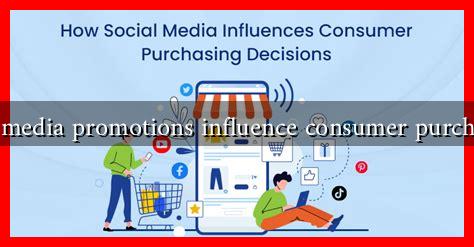-
Table of Contents
- How Do Social Media Promotions Influence Consumer Purchasing Decisions?
- The Rise of Social Media Marketing
- Understanding Consumer Behavior
- The Power of Influencer Marketing
- Targeted Advertising and Personalization
- Engagement Metrics and Consumer Trust
- Conclusion: The Future of Social Media Promotions
How Do Social Media Promotions Influence Consumer Purchasing Decisions?
In the digital age, social media has become a powerful tool for brands to connect with consumers. With billions of users worldwide, platforms like Facebook, Instagram, Twitter, and TikTok have transformed the way businesses promote their products and services. This article explores how social media promotions influence consumer purchasing decisions, backed by research, statistics, and real-world examples.
The Rise of Social Media Marketing
Social media marketing has evolved into a multi-billion dollar industry. According to a report by Statista, global social media advertising spending is projected to reach $138.4 billion by 2025. This growth is driven by the increasing number of users and the effectiveness of targeted advertising.
Understanding Consumer Behavior
To comprehend how social media promotions affect purchasing decisions, it is essential to understand consumer behavior. Social media platforms serve as a space for consumers to discover new products, share experiences, and seek recommendations from peers. The following factors play a crucial role in shaping consumer behavior:
- Peer Influence: Consumers often rely on recommendations from friends and family. Social media allows users to share their experiences, which can significantly impact purchasing decisions.
- Brand Engagement: Brands that actively engage with their audience through comments, likes, and shares create a sense of community, fostering loyalty and trust.
- Visual Appeal: Platforms like Instagram and Pinterest emphasize visual content, making it easier for consumers to connect with products through eye-catching images and videos.
The Power of Influencer Marketing
Influencer marketing has emerged as a dominant force in social media promotions. Brands collaborate with influencers who have established credibility and a loyal following. According to a survey by Influencer Marketing Hub, 90% of marketers believe influencer marketing is effective.
For example, when beauty brand Glossier partnered with micro-influencers, they saw a significant increase in sales. By leveraging the authenticity of these influencers, Glossier was able to reach niche audiences effectively. This strategy not only boosted sales but also enhanced brand visibility.
Targeted Advertising and Personalization
Social media platforms offer advanced targeting options that allow brands to reach specific demographics based on interests, behaviors, and location. This level of personalization enhances the effectiveness of promotions. A study by Facebook found that personalized ads can lead to a 50% increase in purchase intent.
For instance, when Nike launched its “Dream Crazy” campaign featuring Colin Kaepernick, they targeted specific audiences based on their interests in social justice and activism. The campaign resonated with consumers, resulting in a 31% increase in online sales shortly after its launch.
Engagement Metrics and Consumer Trust
Engagement metrics such as likes, shares, and comments are vital indicators of a brand’s credibility. Consumers are more likely to trust brands that have high engagement rates. A study by Nielsen revealed that 92% of consumers trust recommendations from friends and family over any other form of advertising.
Moreover, user-generated content (UGC) plays a significant role in building trust. Brands that encourage customers to share their experiences on social media can create a sense of authenticity. For example, Coca-Cola’s “Share a Coke” campaign invited consumers to share photos with personalized Coke bottles, resulting in millions of social media impressions and increased sales.
Conclusion: The Future of Social Media Promotions
Social media promotions have a profound impact on consumer purchasing decisions. By leveraging peer influence, engaging with audiences, utilizing influencer marketing, and employing targeted advertising, brands can effectively drive sales and build lasting relationships with consumers. As social media continues to evolve, businesses must adapt their strategies to stay relevant in an increasingly competitive landscape.
In summary, the key takeaways regarding the influence of social media promotions on consumer purchasing decisions include:
- The importance of peer influence and community engagement.
- The effectiveness of influencer marketing in reaching target audiences.
- The role of targeted advertising and personalization in enhancing purchase intent.
- The significance of engagement metrics and user-generated content in building trust.
As brands navigate the complexities of social media marketing, understanding these dynamics will be crucial for success in the digital marketplace.
For further insights on social media marketing strategies, you can visit HubSpot’s Social Media Marketing Guide.

